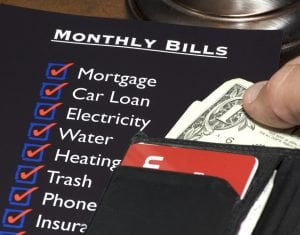The COVID-19 pandemic is wreaking havoc on the finances of many people. Over 22 million workers have become unemployed in a short period of time. Unemployment benefits are available for laid off workers, freelancers, independent contractors, and gig workers, but the availability of some of those benefits has been delayed due to the crush of applications and the need for unemployment offices to create and install new payment systems.
In the meantime, bills are piling up for financially strapped individuals. Many creditors are willing to help you through this difficult time. But the key is to reach out to the creditors before you fall into default, explain your situation, and ask for hardship assistance.
Creditors are receptive now to granting financial help, as they are under tremendous regulatory, governmental, and PR pressures to help affected individuals. And the recent CARES Act enacted by the federal government on March 17, 2020, provides various protections and benefits for individuals and small businesses.
It’s best to request accommodation before you fall behind in your payments. Otherwise, this could ultimately hurt you credit score.
The accommodations typically fall into deferred payments and waived payments. Deferred payments mean that you don’t have to make the payment now, but that you will have to do so at some later agreed upon date. A waived payment means that you don’t have to repay it.
The following provides some advice on how to reduce or delay paying your crucial bills.
Rent
Rent is one of the biggest expenses for individuals.
In many states now, including California and New York, landlords are prohibited for some period of time from performing evictions on renters who can’t pay their rent because of the pandemic.
The Department of Housing and Urban Development has also stopped eviction proceedings of tenants who occupy properties it owns.
With so many renters feeling the economic strain, a number of landlords have been willing to consider the following accommodations:
- Temporary rent relief for 1 to 3 months
- Acceptance of partial payment for overdue rent
- Lowering of the amount of rent moving forward
- Allowing use of the tenant’s security deposit toward rent
Landlords do not want to be looking for replacement tenants in this environment, so they may be willing to make some accommodations.
A phone call or email to your landlord explaining your situation is the best first step. Here is a sample email that you can send to your landlord, which you can tailor to your individual situation:
Dear ______:
As you know, I am a tenant at your property at [Address, City], Apt #___. I am writing this email to let you know that due to the COVID-19 pandemic, I am suffering financial hardship. [I have been laid off from my job.] [My freelance work has been severely affected by the pandemic.] [I have had to file for unemployment benefits, but due to the crush of applications to the unemployment office, my payments have been delayed.]
I have been a good and responsible tenant in the past, and I want to continue being a good tenant, but I am respectfully requesting the following financial accommodation from you to help me get through this difficult time:

